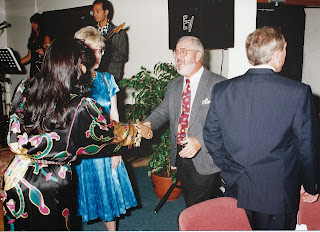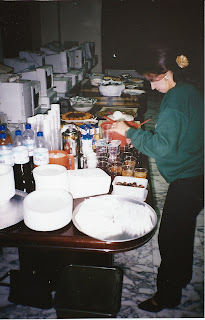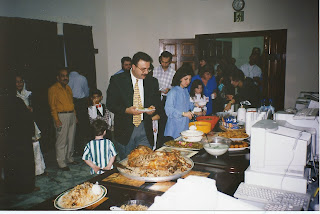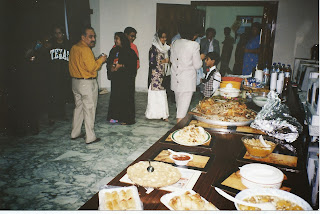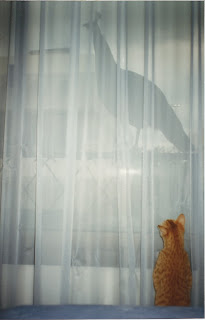 |
Marmelade and the peacock
on the balcony |
Violet was not our only cat in Abu Dhabi. It wasn't our desire to add more cats to our family. And Violet wasn't thrilled about sharing the space with other cats, either. But we really didn't have a choice. And it was all Violet's fault!
Violet was a small long-haired adult female cat who wouldn't take "no" for an answer, but she was happy to hand that answer out.
For example, Violet got what she wanted by refusing what we offered. She wouldn't eat dry food, so we had to buy canned food. But she also wouldn't eat anything from a can that had been opened before. If the food was cold, she wouldn't eat it. I tried warming it up in the microwave, but that didn't fool her. Unless her food was freshly dispensed from a new can, she wouldn't have it. Since Fancy Feast didn't appear on the grocery store shelves very often in Abu Dhabi, we had to buy big cans of cat food from which Violet would eat one large spoonful, leaving us with leftover cat food - leftover
smelly cat food - every day.
We tried just throwing the cans away with our trash. But if we didn't put the trash out just as it was being collected, the feral cats in the neighborhood would dig through the bags, spreading our garbage evereywhere. And whose fault was it? Violet's.
Next we decided we would use the leftover food to feed selected feral cats since they were going to get the food anyway. We noticed a beautiful gray cat that Alex named Mosby, for John S. Mosby, the Confederate cavalryman of the Civil War referred to as the Gray Ghost. Mosby used to follow us along the sidewalk as we walked to visit neighbors. He didn't seem all that wild, so we fed Mosby, until he disappeared.
There were so many feral cats in Abu Dhabi that the city made the rounds at night collecting them. The only cats they didn't collect were those wearing collars or those that had been collected previously by an organization that paid to have them neutered and then resettled them in colonies where they also fed them. To make those cats identifiable, a small nick was cut in the side of one of their ears. Mosby did not have a nick in either of his ears. So he disappeared. But we didn't know the importance of the nick in the ear at that point.
We saw a couple of kittens that also took to following us along the sidewalk. We thought they looked like good prospects for eating up the food Violet wouldn't eat. We began feeding them at the front of the house each morning, but it didn't take too long for the larger cats to begin attacking the kittens to get at the food. One morning we were awakened by cat fight noises at the front door. That was the clue that we were going to have to let the kittens into the house.
Now Violet had companions, though very much unwelcome ones.
 |
| Marmelade and Fudge |
The two kittens were both males. One was an orange and white tabby and the other completely orange, with a misshapen tail. The orange and white kitten ended up with the name Fudge. The all orange one, Marmelade. While it was clear the two were on their own, Fudge didn't have the characteristic wildness of a feral cat. He settled down right away as a domestic cat. Marmelade on the other hand was not comfortable around people. Fudge would climb into my lap. Marmelade wouldn't let me get near him unless he was eating and I approached him from behind. Then I could grab him around his belly and move him somewhere else. But that didn't make him willing to put up with any human attention.
Marmelade also had his own jealousies over food. He used to position himself in front of both his and Fudge's food dishes so that Fudge would have to wait to eat, that is if Marmelade left anything for him. Sometimes I had to pick him up and move him into a bathroom where I could close the door to keep him in so Fudge could eat.
The day after Fudge and Marmelade moved in, we realized they had a sister. She was a calico with exactly the same face as the boys. She started hanging around our house, but we just couldn't let one more kitten move into our space. Instead, we started feeding her at the back door, just outside the kitchen.
And Violet? She wouldn't allow the boys near her food dish. When the boys moved in, she was still considerably larger than they were, so she was effective at blocking their access to their food. I tried putting her dish at the other side of the kitchen, but she just parked herself at the entrance to the kitchen and kept the boys out, so we resorted to putting Violet's food on the top floor of the house. That kept two floors between her and the boys. So at this point, we were putting one dish on the third floor, two in the kitchen, and one in the back yard.
 |
| The cats at nap time |
Meanwhile, Missy had kittens, one male and one female. Two more dishes in the back yard at feeding time. The kittens got pretty independent, and then the female disappeared. Maybe she just wandered to a new area. We still didn't know about the organization that collected feral cats and had them neutered. We just knew she disappeared. The male cat, Eddy, stopped spending much time in the back of our house, although we saw him now and then.
With time, Marmelade warmed up to us and began hanging around with us, even more than Fudge. He used to jump up on the sofa and then push his body right up to mine, not leaving a space between us big enough to slip a piece of paper into. By then, all three of the cats spent the nights on our bed. Well, sort of. Violet still didn't want to see the boys, so she slept under the duvet. The boys slept wherever they wanted to.
A few months later, Missy had a second litter of kittens, four cats, two calicos and two tabbies. Eddy started coming around much more often after the kittens were born and often managed to suckle from Missy along side his siblings. Four more dishes in the back yard.
 |
Missy in front with her kittens at dinner time,
with Fudge wearing his collar at the right |
Fudge and Marmelade weren't happy staying indoors all of time, so we tried to keep collars on them. But they would work themselves out of them while they were outside. One night, Marmelade didn't come home. He didn't show up the next day either. The vet confirmed our worst fears - Marmelade got caught up in a feral cat sweep. That is when we learned about the nick in the ear being a mark that cats had been neutered. The vet didn't think we would want the nick in the ears of Fudge and Marmelade when he fixed them because they were our cats, not cats on the street. If only the boys had kept their collars on.
Once Missy's second batch of kittens were no longer nursing, we brought her to the vet for some fixing and this time we insisted her ear be nicked. The kittens might not need her much longer, but we didn't want her to disappear, too. The nick on Missy's ear was so small it was almost invisible.
One day after Marmelade's disappearance, I was at the vet's when I noticed a kitten that looked just like Fudge in a pen in the waiting room. He had been picked out by someone and then returned when the prospective owner realized she couldn't take him back to the U.S. with her. He just had to come home with me. Alex named him RF for Rocket Fuel because he ran around the house so fast. When I took him in to be neutered, I insisted that his ear be nicked so we wouldn't have to worry about losing him. But instead of the tiny nick like the one in Missy's ear, RF's ear looked like someone had taken a bite out of it. RF's arrival brought us back to three indoor cats and five - and sometimes six, when Eddy came around - outdoor cats.
And that's how we herded cats in Abu Dhabi.

